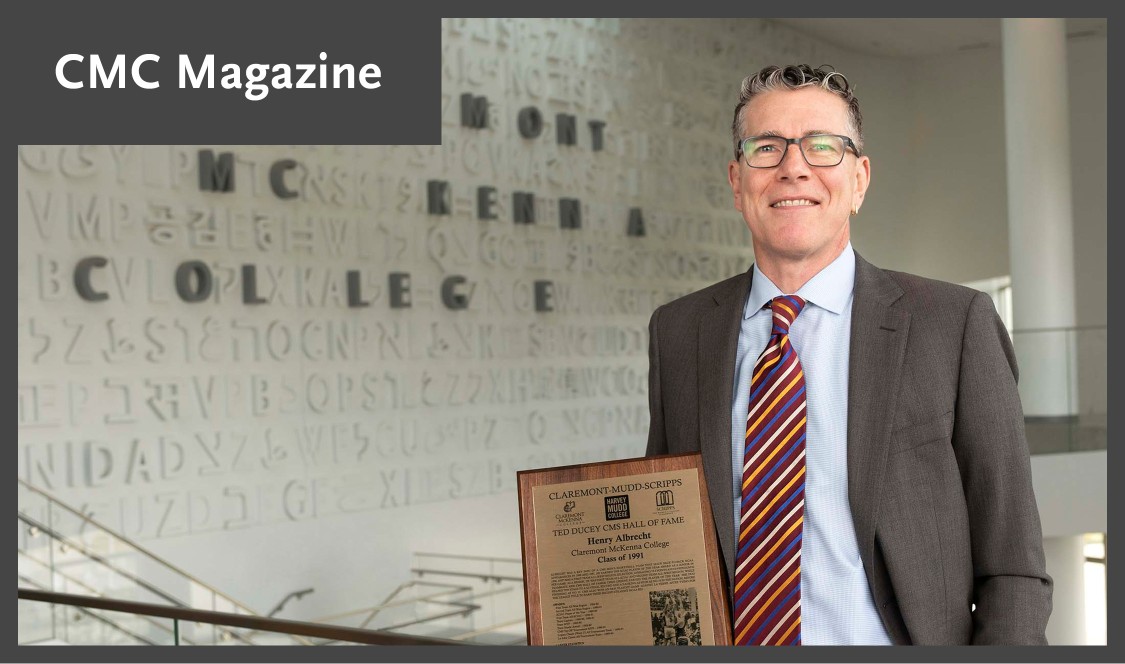Prior to being inducted as a 2024 member of the Ted Ducey CMS Hall of Fame, Henry Albrecht ’91 P’23 P’26 had time to reflect on a few of his proudest achievements as a scholar athlete at CMC.
At the top: The team’s lesser-known “Hustle Award” he received as a sophomore center playing for Coach David Wells ’72.
“Before the Hall of Fame, that’s the award I was most proud of,” Albrecht said. “It means that I was working hard by diving for loose balls, taking charges, doing the little things—and that’s the kind of teammate I aspired to be. Someone who would lead by example and give all of my effort.”
For Albrecht, being at CMC as an adult hasn’t been uncommon given that his son, Alexander ’23, was a recent graduate, and daughter, Josephine ’26, is still attending. But returning for the CMS Hall of Fame ceremony in January allowed him an opportunity to be more introspective and think about who he was—and aspired to be—while in his early 20s.
A Literature and Economics major at CMC, Albrecht said the combination of rigorous academics and athletics provided him with the ultimate liberal arts experience. The collective lessons would also propel his eventual success in business as the founder of Limeade, an employee wellbeing software platform that he started in 2006. The company went public in 2019 and was recently purchased by WebMD.
Originally from Seattle, Albrecht said he was fortunate to have access to so many dynamic experiences at CMC. “The teamwork, the leadership, the hard work—I was so lucky to get that from basketball. But I also took advantage of creativity, communication, and problem-solving— how to craft a vision and a story. That all came from Literature. Then there was the practicality, logic, and decision-making from Economics,” Albrecht said. “To me, those three elements, plus the friends and connections I made at CMC, helped prepare me for everything I’ve experienced in life.”
After graduation, Albrecht played professional basketball in Portugal for a year. He took a variety of jobs before earning his MBA from Northwestern’s Kellogg School of Management. An inspiring career stop at Intuit, a business software specialist in Silicon Valley, gave him the confidence to execute on a long percolating idea about work culture—or more specifically, how to measure and improve human well-being in a work world often at odds with human health.
Albrecht put his life savings into the company and started it in his basement. He eventually partnered with Dr. Laura Hamill, an organizational psychologist from Microsoft, and together they applied scientific thinking to well-being, mental health, and burnout to reinforce a novel vision of wider organizational support—or what he called “the science of care.”
“If people perceive that their company cares about them, they will stay longer. They will tell their friends to come work there. They won’t burn out and quit,” Albrecht said. “And they’ll be like great teammates on a sports team. They’ll show up on time, love what they do, get through the hard times with resilience and grit, and perform better. But it’s all about putting the right tools in place.”
Despite plenty of doubters while Albrecht was raising capital, he never wavered in his vision for Limeade. Never took no for an answer. Maybe it was the competitive athlete in him; the consummate hustle player who loved practice and pickup games as much as the real thing.
It’s what also informs his advice to CMC students today—and why he gets a gleam in his eye when he teases his next career move, saying simply, "Stay tuned.”
“I just love the game. Even in my work career, I’ve always said, ‘I want to be in the game.’
“It doesn’t matter if you’re a preschool teacher, a health care worker, a politician, a business leader—whatever it is. You have to remind yourself that you can be a disruptor, an innovator. That your decisions actually matter to the world we’re making together,” Albrecht said. “But first, you have to be willing to get in the game.”

